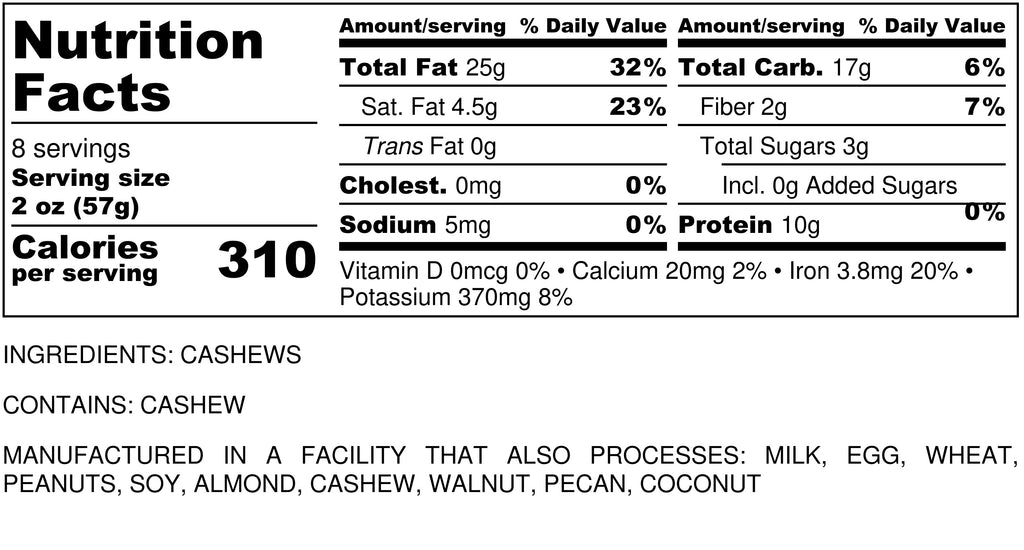

- #1 oz cashew nutrition facts how to
- #1 oz cashew nutrition facts plus
- #1 oz cashew nutrition facts free
Beachbody, LLC is the owner of the Beachbody and Team Beachbody trademarks, and all related designs, trademarks, copyrights, and other intellectual property.Īpple logo, Apple TV, App Store, iPad, iPhone, and iPod touch are registered trademarks of Apple Inc. The contents on our website are for informational purposes only, and are not intended to diagnose any medical condition, replace the advice of a healthcare professional, or provide any medical advice, diagnosis, or treatment. These products are not intended to diagnose, treat, cure, or prevent any disease.Ĭonsult your physician and follow all safety instructions before beginning any exercise program or using any supplement or meal replacement product, especially if you have any unique medical conditions or needs. *These statements have not been evaluated by the Food and Drug Administration. The testimonials featured may have used more than one Beachbody product or extended the program to achieve their maximum results. Exercise and proper diet are necessary to achieve and maintain weight loss and muscle definition. +Results vary depending on starting point, goals and effort. The information provided on this website (including the Blogs, Community pages, Program Materials and all other content) was originally intended for a U.S. I recommend going with the milk you enjoy best.”įor more inspiration, read 11 Delicious Dairy-Free Milk Alternatives. Naturally, cashew milk isn’t your only dairy-free option. Cashew milk can be included in plant-based dietsįollowers of a vegan or vegetarian diet can use cashew milk in place of cow’s milk for recipes from soups to sauces and even baked goods.īut please note: Cashew milk is not a direct replacement for cow’s milk in regards to protein.įor those craving ice cream, you can even find cashew milk ice cream and other frozen desserts at the store. Cashew milk contains fewer caloriesĬompared to cow’s milk and even almond milk, storebought cashew milk is low in calories.Īt just 25 calories per cup, this seems like a calorie-saving food swap as long as you’re mindful not to overeat elsewhere. Homemade cashew milk won’t contain much of these nutrients. To cash in on these benefits, you’ll need to buy fortified cashew milk.
#1 oz cashew nutrition facts free
Vitamin E is an antioxidant that might protect you from harmful free radicals from the environment and natural human metabolism. Vitamin A is key for immune function, vision, and much more.
#1 oz cashew nutrition facts plus
Cashew milk can provide calcium plus vitamins A, D, and Eįortified cashew milk is a good source of calcium and vitamin D, nutrients that are important for bone health. While cashews contain saturated fat, it’s mostly in the form of stearic acid, which is believed not to negatively impact blood cholesterol. Here’s how: The fat in cashews is primarily monounsaturated fat, which may help maintain healthy cholesterol levels. Cashew milk is a source of healthy fatsĬashew milk gets its taste from mostly healthy fats, which is better for your heart. To get the benefits of all three, layer them as ingredients in a smoothie as we did for this Banana Cashew Latte.ġ. Takeaway: Choose the nut (or oat) milk of your fancy! The nutritional differences aren’t compelling enough to make a recommendation. Unlike oats, oat milk does not contain as much fiber. Oat milk has more calories and carbs, but at 60 calories a cup, it’s not an unreasonable amount for milk.

Both contain similar amounts of fortified nutrients. Unless you have a nut allergy, oat milk isn’t much better for you than cashew milk. Straining out the solids and adding water will make your beverage less calorie-dense but may cause some loss of nutrients. If you’re making nut milk at home, know that almonds are naturally higher in vitamin E and calcium, but cashews contain more vitamin K and zinc. Store-bought non-dairy milk is usually fortified with vitamins A and D - the nutrients of which nuts contain very little. Both almond and cashew milk are good options for those allergic to dairy.īoth milk types have similar amounts of fortified nutrients. Which nut milk is the healthiest? With store-bought varieties, it’s a tie. Is cashew milk or almond milk better for you? With this assumption, a cup of homemade cashew milk has 152 calories compared to 25 calories in unsweetened store-bought cashew milk (see table below).
#1 oz cashew nutrition facts how to
Recipes for how to make cashew milk call for a 1:4 ratio of cashew: water and yield about 5 cups of milk. Since store-bought cashew milk is filtered and diluted with water, it’s lower in calories than its homemade cousin.Ĭashews grind easily, so there’s no need to strain the liquid. at Savor Nutrition, “Store-bought cashew milk is grounded cashews that are soaked in water then filtered. The milk has a light, nutty taste that’s not too different from almond milk.” How healthy is cashew milk? One thing’s for certain: nut milk nutrition varies widely depending on how it’s made.Īccording to Brittany Crump, M.P.H., R.D.


 0 kommentar(er)
0 kommentar(er)
